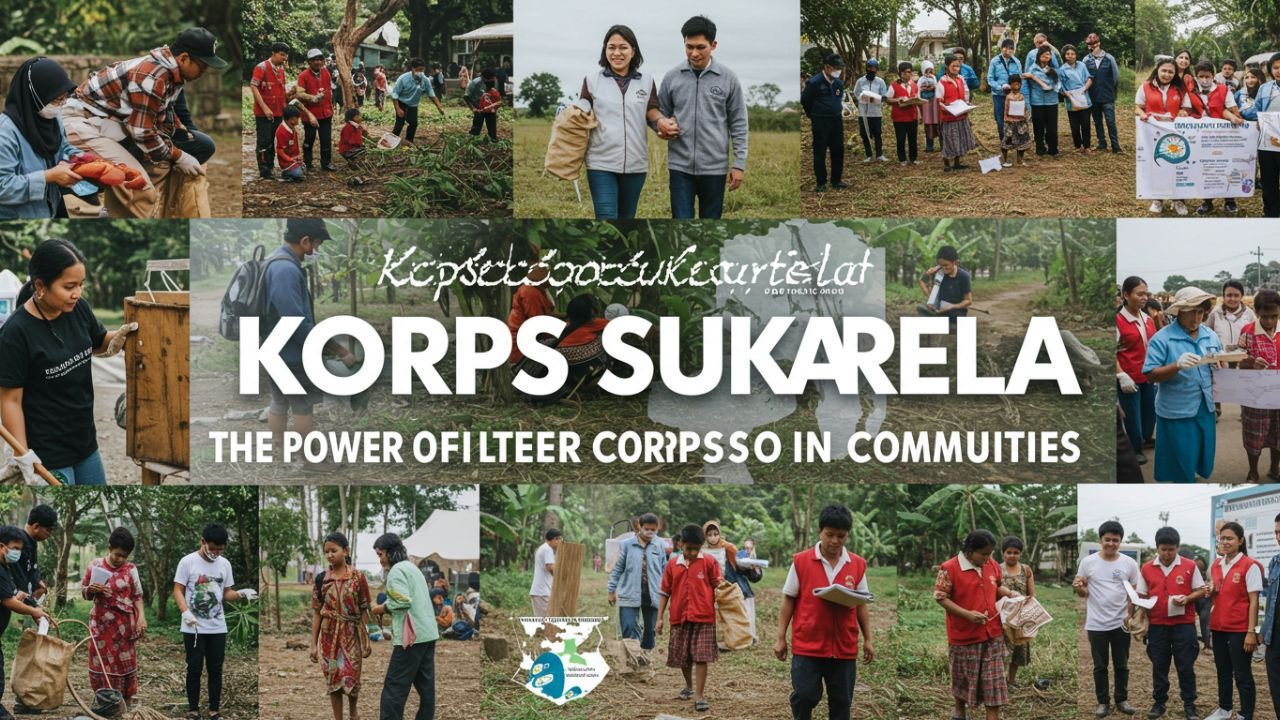In many parts of the world, volunteerism is the heart of social progress. One of the most recognized forms of organized community service is the korps sukarela, or volunteer corps. These groups unite individuals who dedicate their time and energy to help others without expecting financial gain. The existence of korps sukarela proves that collective action can create lasting change and uplift society.
This article explores the definition, history, functions, challenges, and future of korps sukarela while showing why these volunteer corps remain relevant in modern times.
Understanding Korps Sukarela
The term korps sukarela directly translates to “volunteer corps.” It refers to structured groups of volunteers who serve in various fields such as emergency response, education, health, environmental care, and community empowerment.
Unlike profit-driven organizations, korps sukarela thrives on the principle of selfless service. Members come from diverse backgrounds, yet share the same motivation: to contribute positively to society.
Historical Roots of Korps Sukarela
Although the idea of organized volunteer corps feels modern, the roots of korps sukarela stretch far back into history. Communities have always relied on mutual aid, whether during natural disasters, food shortages, or social crises.
Over time, these spontaneous acts of kindness evolved into more structured initiatives. From grassroots rescue groups in rural areas to modern organizations supporting humanitarian causes, the korps sukarela has grown into a global phenomenon that reflects the timeless human spirit of cooperation.
Core Principles of Korps Sukarela
Every korps sukarela is guided by strong values that define its purpose:
-
Altruism – Prioritizing the needs of others over personal gain.
-
Teamwork – Achieving more by working collectively.
-
Discipline – Operating with organization and responsibility.
-
Compassion – Providing emotional as well as practical support.
-
Commitment – Staying dedicated to long-term service.
These principles ensure that volunteer corps are not just reactive but also proactive in shaping better communities.
Key Roles and Functions of Korps Sukarela
The korps sukarela performs several critical functions that fill gaps in both local and national support systems:
1. Emergency and Disaster Relief
Volunteer corps are often first responders during natural disasters like floods, earthquakes, or fires. They provide rescue operations, distribute relief goods, and organize shelters.
2. Health Services
From blood drives to free clinics, korps sukarela plays an important role in improving access to healthcare, particularly in underserved communities.
3. Education and Literacy Programs
Some groups focus on tutoring children, running libraries, or organizing workshops to enhance learning opportunities.
4. Environmental Conservation
Volunteer corps frequently take part in tree planting, recycling efforts, and awareness campaigns about sustainable living.
5. Social Support
Korps sukarela members also assist marginalized groups, such as orphans, the elderly, or individuals with disabilities, by offering companionship and resources.
Why Korps Sukarela Matters Today
In the modern era, societies face new and complex challenges such as climate change, pandemics, and social inequality. Here, korps sukarela becomes more than just a helping hand it becomes a lifeline.
Their presence is essential because:
-
They respond faster than many formal institutions.
-
They build trust within communities.
-
They foster social responsibility and solidarity.
-
They provide hope in times of crisis.
By bridging the gap between governments, NGOs, and citizens, volunteer corps become the backbone of community resilience.
Common Challenges for Korps Sukarela
Despite their noble mission, it’s groups encounter obstacles:
-
Resource Limitations – Lack of funding and proper tools can hinder operations.
-
Volunteer Retention – Keeping members motivated over time is not easy.
-
Training Needs – Responding to disasters and emergencies requires specialized skills.
-
Recognition Issues – Many volunteer corps go unnoticed despite their contributions.
Addressing these challenges requires stronger collaboration with stakeholders and wider public support.
Inspiring Success Stories
Numerous korps sukarela groups have left a lasting mark on their communities. For instance, during major floods in Southeast Asia, volunteer corps organized rescue boats and food distribution, saving countless lives.
In rural villages, it’s members have introduced literacy programs that empowered children to pursue education. Environmental volunteer groups have also successfully rehabilitated forests and rivers, demonstrating the tangible benefits of community-led action.
How to Join a Korps Sukarela
Becoming part of a korps sukarela is both fulfilling and impactful. Here’s how interested individuals can participate:
-
Search for Local Chapters – Many operate under schools, NGOs, or municipal offices.
-
Attend Orientation – Learn about the mission, activities, and responsibilities.
-
Complete Training – Some groups require first aid, disaster response, or leadership training.
-
Participate Actively – Contribute to projects, events, and outreach programs.
-
Stay Committed – Consistency ensures long-term positive impact.
The Future of Korps Sukarela
Looking ahead, the future of korps sukarela is bright. With digital platforms, volunteer corps can now connect more easily, recruit members faster, and launch online campaigns for support.
Partnerships with governments and private sectors may also strengthen their resources, ensuring they can handle larger challenges. Most importantly, younger generations are showing greater interest in social causes, which guarantees that volunteerism will continue to thrive.
Conclusion
The korps sukarela represents humanity at its best. Rooted in compassion and fueled by commitment, these volunteer corps bring people together to address pressing community needs. Their work in disaster response, education, healthcare, and environmental conservation proves that even small groups of dedicated individuals can achieve great change.
As we move forward in a world filled with uncertainties, supporting and joining korps sukarela is not only an act of service but also a pathway to building resilient and compassionate societies.
